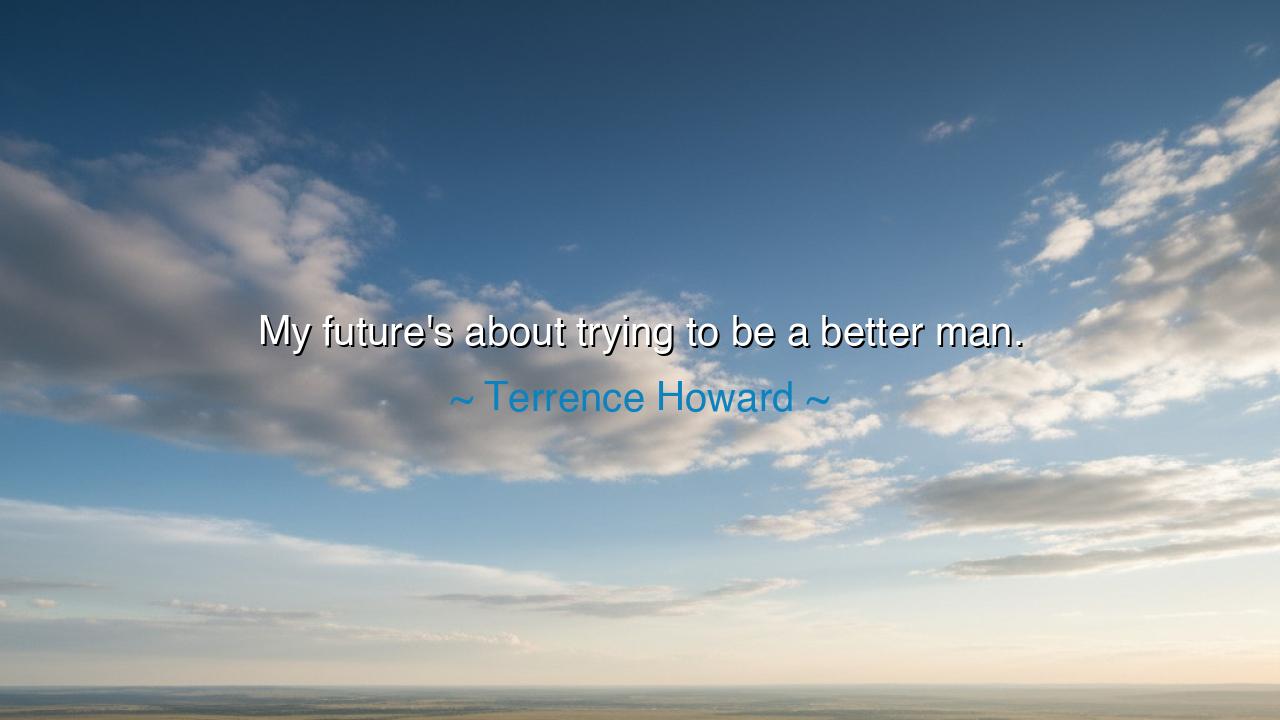
My future's about trying to be a better man.






"My future's about trying to be a better man." These words spoken by Terrence Howard embody the essence of personal growth and self-improvement, a timeless pursuit that has been at the heart of the human experience for centuries. Howard’s reflection is not merely about career aspirations or external success, but about a deep, internal journey—one focused on the transformation of the soul, the refinement of character, and the continual effort to become a better person. This desire to be better, to transcend one’s flaws and limitations, is a fundamental principle in many of the world’s philosophies and teachings.
In the ancient world, the pursuit of self-improvement was seen as a sacred duty, central to the idea of virtue. The Greeks, particularly those influenced by Socrates, believed that the purpose of life was to cultivate wisdom and moral excellence. Socrates famously said, “An unexamined life is not worth living,” underscoring the belief that to become a better person, one must first look inward, examining one’s actions, thoughts, and desires. This idea was not only about knowledge, but about living a life aligned with the highest ideals of justice, courage, and wisdom. To strive to be a better person, in the eyes of the ancients, was to live a life of purpose, integrity, and reflection.
The same pursuit is echoed in the teachings of Confucius, who emphasized the importance of self-cultivation. He taught that a true gentleman (or "junzi") was one who constantly sought to improve themselves, who was committed to learning, humility, and moral excellence. Confucius believed that the improvement of one's character would not only elevate the individual, but contribute to the well-being of society. Just as Terrence Howard reflects on his future as an opportunity for personal growth, so too did the ancient sages recognize that the pursuit of becoming a better person was the foundation of a more harmonious society.
In the realm of history, we find figures who embodied this constant striving for personal growth. Marcus Aurelius, the Stoic Emperor of Rome, wrote in his Meditations about the importance of self-discipline and personal improvement. Despite his power and influence, he saw himself as a servant of virtue, constantly challenging himself to be better—to be more just, more compassionate, more patient, and more thoughtful in his decisions. Like Howard’s desire to be a better man, Aurelius understood that the pursuit of moral excellence was a life-long journey, one that required vigilance, reflection, and humility. The wisdom that Aurelius shared with the world was born not from the height of his empire, but from his constant effort to refine his own character.
The lesson in Howard’s words is clear: self-improvement is not an external endeavor, but an internal one. It is not about what others think of us, but about how we see ourselves and how we act upon our deepest values. As Terrence Howard strives to be a better man, he reflects the timeless truth that true greatness lies not in the accumulation of wealth or fame, but in the ongoing transformation of the self. To pursue self-betterment means to confront our weaknesses, to strive against ego and pride, and to remain open to learning throughout our lives. It is a quiet, inner battle that requires strength and resolve, but the rewards are immense: a life that is aligned with our deepest ideals and a soul at peace.
This journey towards becoming better requires more than just good intentions; it demands action. In our own lives, we must commit to personal reflection, to looking honestly at where we have fallen short, and to seeking ways to improve. Whether it is patience, kindness, or integrity, we must make a deliberate effort to embody these qualities in our interactions with others. Like Marcus Aurelius, we should embrace discipline and self-examination, striving each day to become more aligned with our highest selves.
In the end, Howard’s words remind us that the future is not just a destination, but a journey—one that is shaped by our commitment to growth and self-improvement. To be a better person is not a single act, but a way of being—a continuous effort to rise above our flaws, to push ourselves to live with purpose and compassion. Just as the greatest minds of the past have taught, true greatness lies in the ability to transform oneself in the pursuit of virtue and wisdom. The future, then, is not something that happens to us—it is something that we create, one action at a time. Let us all strive to become better, not for recognition, but for the fulfillment of living a life of true meaning.






AAdministratorAdministrator
Welcome, honored guests. Please leave a comment, we will respond soon